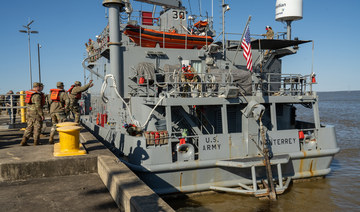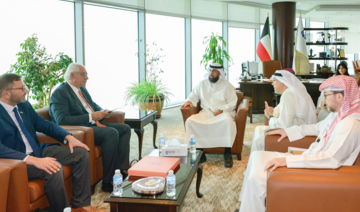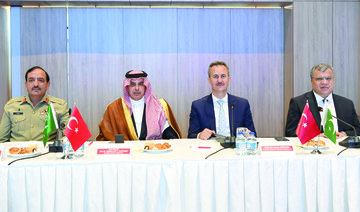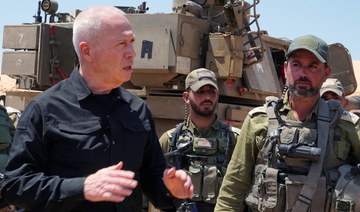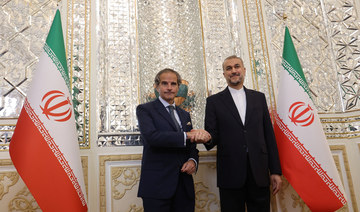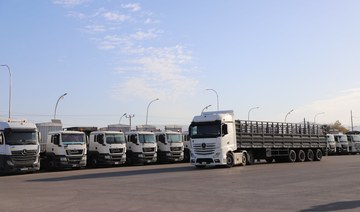BAGHDAD: The Iraqi government’s move this week to place Iranian-backed militias under the command of the armed forces is a political gamble by a prime minister increasingly caught in the middle of a dangerous rivalry between Iran and the U.S, the two main power brokers in Iraq.
Facing pressure from the US to curb the militias, the move allows Prime Minister Adel Abdul-Mahdi to demonstrate a tough stance ahead of a planned visit to Washington, expected to take place in the coming weeks. It is unlikely, though, that he would be able to rein in the powerful Iran-supported militias, and he risks coming off as a weak and ineffective leader if he doesn’t.
Besides having built credibility as an effective force against the Daesh group, the mainly Shiite militias, known collectively as the Popular Mobilization Forces, are a significant political force, with government ministers and 48 seats in the 329-member parliament.
The PMF “is among the parties that achieved victory for Iraq against (the Daesh group), liberating Mosul and restoring security to the country. The time has come to organize their status in a legal way... meaning no weapons outside the framework of the state,” Abdul-Mahdi told reporters at a weekly news conference Tuesday.
That’s a tough sell in a country awash with arms and militias, many of which operate outside the state’s control.
The leaders of the larger militias, like Asaib Ahl Al-Haq, Badr and the Peace Brigades, welcomed the decision, calling it a step in the right direction. But one militia leader said his group has secret offices that they will not close, calling Abdul-Mahdi’s decision a “US directive.” Speaking to The Associated Press on condition of anonymity, he said the prime minister and the Americans “are dreaming” if they think they can implement the decision.
The PMF emerged following a call in the summer of 2014 by Iraq’s top Shiite cleric, Grand Ayatollah Ali Al-Sistani, for volunteers after Daesh militants overran nearly a third of Iraq, including the northern city of Mosul, Iraq’s second-largest. Iraq’s military and security forces collapsed in the face of the onslaught.
Tens of thousands heeded the cleric’s call, enlisting in multiple militia factions, many of which had existed for years and even fought American forces in Iraq following the 2003 invasion. Sanctioned by the Iraqi government but dominated by Shiite groups with close ties to Iran, the militias played a key role in the war against IS and the protection of Shiite shrines in Iraq. They came out of the war with the image of an almost holy force defending Iraq’s Shiite Muslim majority.
That has helped enshrine the militias as a major political and paramilitary player in post-IS Iraq, despite US suggestions that they should be disbanded after IS was driven from the country. Militia factions armed with tanks and heavy weapons are present in almost every Iraqi province, in many cases deeply embedded in local governance and rivaling state institutions. Together, they are believed to number more than 140,000 fighters.
The groups’ expanding power, including in some strategic predominantly Sunni areas, worries not only Iraq’s Sunni minority but also some officials in the military and the Shiite-led government, who fear the militias will dominate Iraq the way the paramilitary Revolutionary Guard does Iran and the militant group Hezbollah does Lebanon.
“The Iranian regime’s objective remains to incorporate the (PMF) as an independent formation within the military structure, a la IRGC, to become an Iraqi Revolutionary Guard,” said Joe Macaron, resident fellow at the Arab Center Washington DC, referring to Iran’s Revolutionary Guard. “However, there is another Iraqi view within the Shiite establishment that calls for fully integrating the militias in the military.”
In March 2018, then-Prime Minister Haider Al-Abadi sought to contain the Iranian-backed militias in Iraq by formally making them part of the armed forces — based on a parliament vote in November 2016 — but the militias remained largely independent.
Abdul-Mahdi’s decree, issued Monday night, went further than just placing them under the army’s command. It ordered the militias to relinquish their militia names and shut down their local headquarters and economic offices. It gave them until the end of the month to comply and said those who do not wish to do so can transform into unarmed political parties. Any armed faction working “openly or secretly” against the new rules would be considered illegitimate.
It did not say how the order would be implemented, nor did Abdul-Mahdi address that at his press conference on Tuesday.
The timing of the decree was noteworthy, amid spiraling tensions between the US and Iran and a string of unclaimed attacks on US interests in the country that have added to regional jitters and raised fears Iraq could be a become a battleground. The attacks, including rockets fired near the US Embassy and US military bases, have embarrassed the Iraqi leadership, making its delicate balancing act between its two allies significantly more difficult.
While clearly seeking to cater to the US, the move by Abdul-Mahdi was also clearly coordinated with Iran, with the understanding that these groups will not be disbanded, nor fully integrated into the military.
Critics called it a toothless decision that will not translate on the ground.
“These factions will not respond to the government, especially (because) they are ideologically aligned with Iran and directly receive orders from Tehran,” said Iraqi political analyst Watheq Al-Hashimi.
Thafer Al-Ani, a Sunni lawmaker, said he hoped it will not be merely “ink on paper,” adding that it would have been better to merge the PMF with the security forces and abolish the militias completely. Under the prime minister’s decree, the PMF reports to a military commander who reports directly to the premier, rather than being fully incorporated into the defense or interior ministries.
Macaron said Abdul-Mahdi is buying time as he is under pressure from both Washington and Tehran.
Formally placing the PMF under the command of the Iraqi military may be a way of deterring an attack by the US or others. American officials have suggested the US would retaliate against any attack targeting US interests in Iraq.
“Some in Washington and the Arab world are welcoming this Iraqi decree with jubilation but the fact is it will not be implemented without Iranian consent,” Macaron said.
“It actually preserves and legitimizes Iranian influence on the long-term,” he added.
Iraqi PM takes a gamble with move on Iran-backed militias
Iraqi PM takes a gamble with move on Iran-backed militias
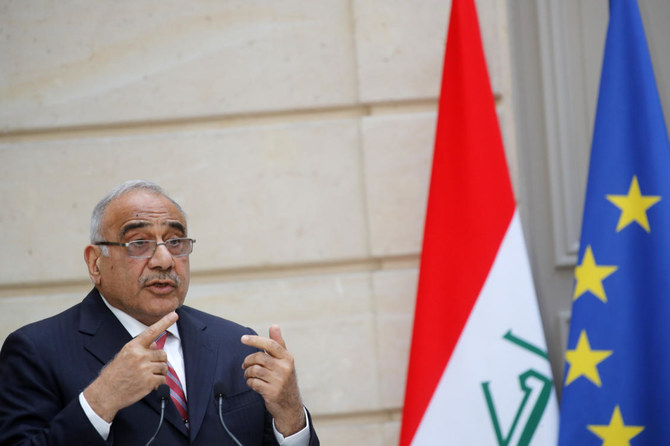
- The leaders of the larger militias, like Asaib Ahl Al-Haq, Badr and the Peace Brigades, welcomed the decision, calling it a step in the right direction
- The move allows Prime Minister Adel Abdul-Mahdi to demonstrate a tough stance ahead of a planned visit to Washington
US completes construction of Gaza aid pier

WASHINGTON: The US military has completed construction of its Gaza aid pier, but weather conditions mean it is currently unsafe to move the two-part facility into place, the Pentagon said Tuesday.
The pier — which the US military started building last month and which will cost at least $320 million — is aimed at boosting deliveries of desperately needed humanitarian assistance to Gaza, which has been ravaged by seven months of Israeli operations against Hamas.
“As of today, the construction of the two portions of the JLOTS — the floating pier and the Trident pier — are complete and awaiting final movement offshore,” Deputy Pentagon Press Secretary Sabrina Singh told journalists, using an acronym for Joint Logistics Over-the-Shore, the official name for the pier capability.
“Today there are still forecasted high winds and high sea swells, which are causing unsafe conditions for the JLOTS components to be moved. So the pier sections and military vessels involved in its construction are still positioned at the port of Ashdod,” in Israel, Singh said.
US Central Command (CENTCOM) “stands by to move the pier into position in the near future,” she added.
The vessels and the under-construction pier were moved to the port due to bad weather last week. Once the weather clears, the pier will be anchored to the Gaza shore by Israeli soldiers, keeping US troops off the ground.
Aid will then be transported via commercial vessels to a floating platform off the Gaza coast, where it will be transferred to smaller vessels, brought to the pier, and taken to land by truck for distribution.
Plans for the pier were first announced by US President Joe Biden in early March as Israel held up deliveries of assistance by ground, and US Army troops and vessels soon set out on a lengthy trip to the Mediterranean to build the pier.
Some two months later, the humanitarian situation in Gaza remains dire. The United Nations said Tuesday that Israel had denied it access to the Rafah crossing — the key entry point for aid into the besieged territory.
The White House said the closing of Rafah and the other main crossing, Karem Shalom, was “unacceptable” and needed to be reversed.
In addition to seeking to establish a maritime corridor for aid shipments, the United States has also been delivering assistance via the air.
CENTCOM said American C-130 cargo planes dropped more than 25,000 Meal Ready To Eat military rations into Gaza on Tuesday in a joint operation that also delivered the equivalent of more than 13,000 meals of Jordanian food supplies.
“To date the US has dropped 1,200 tons of humanitarian assistance,” CENTCOM said in a statement.
Gaza’s bloodiest-ever war broke out following Hamas’s unprecedented October 7 attack on Israel, which resulted in the deaths of more than 1,170 people, mostly civilians, according to an AFP tally of Israeli official figures.
Israel’s retaliatory offensive has killed at least 34,789 people in Gaza, mostly women and children, according to the Hamas-run territory’s health ministry.
Kuwait, Turkiye sign agreements during emir’s state visit
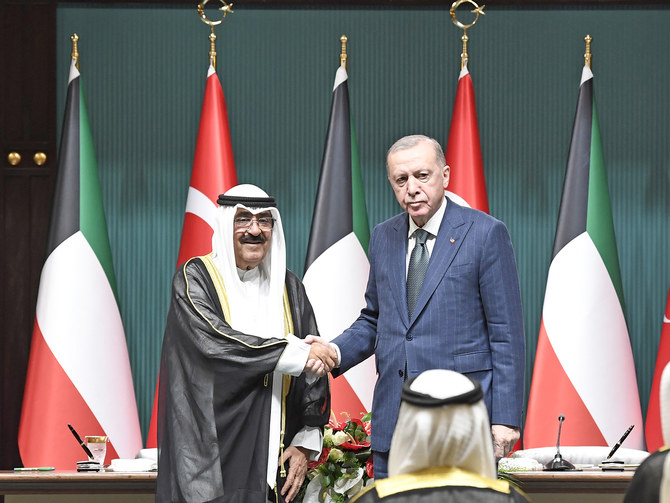
- Several cooperation deals inked at the Presidential Palace in Ankara
LONDON: Kuwait’s Emir Sheikh Meshal Al-Ahmed Al-Jaber Al-Sabah held talks on Tuesday with Turkish President Recep Tayyip Erdogan on a range of regional and international issues during his official visit to Ankara.
The two parties “expressed a common desire to bolster cooperation and coordination in many fields,” in particular trade and investment, and the emir said the two countries had the potential to boost trade exchange and investment opportunities, the Kuwait News Agency reported.
He went on to praise the “historic relations between our countries for the past 60 years, since their establishment in 1964,” and added “we express our aspirations toward promoting these relations to honor the aspirations of our peoples.”
Sheikh Meshal, who had arrived in the Turkish capital earlier on Tuesday, also praised Turkiye’s “honorable” support for Kuwait during Iraq’s invasion in 1990.
The Kuwaiti emir welcomed the start of negotiations for a free trade agreement between the GCC (Gulf Cooperation Council) and Turkiye, which commenced following the signing of a joint statement on April 21.
He added: “We affirm our aspiration for strengthening joint cooperation in all fields, especially in the defense domain through government-to-government contracting.”
The two leaders witnessed the signing of several cooperation agreements at the Presidential Palace in Ankara, including an executive protocol between the Kuwaiti and Turkish defense ministries.
The countries’ foreign ministries signed a memorandum of understanding to establish a strategic dialogue, while the Kuwaiti Civil Defense and the Turkish Ministry of Interior Disaster and Emergency Management Authority also signed a memorandum.
Letters of intent were signed between the Kuwait Direct Investment Promotion Authority and the Turkish General Authority for Free Zones in the Ministry of Trade on cooperation in the free zones field, and between the Kuwaiti Ministry of State for Housing Affairs and the Turkish Ministry of Environment, Urbanization and Climate Change on cooperation in housing and infrastructure.
The Kuwait Investment Authority and the Turkish Presidency Investment Office signed a memorandum regarding cooperation on investment promotion.
Erdogan awarded Sheikh Meshal with the State Order “to reflect deep-rooted ties between the two friendly countries,” KUNA said.
The emir also paid a visit to the Ataturk Mausoleum in Ankara during the visit.
Jordan’s Queen Rania highlights effects of war in Gaza on the world

- She tells Milken Institute Global Conference 2024 in Los Angeles the conflict has ‘divided people along new battle lines’ and fueled a growing sense polarization among peoples
- ‘The only way we can achieve security in our part of the world is through a negotiated peace, where Palestinians have not a promise of statehood, but actual statehood,’ she says
LONDON: Jordan’s Queen Rania on Tuesday discussed the global effects of Israel’s war on Gaza and called for a just solution to the wider Israeli-Palestinian conflict.
Speaking during a session at the Milken Institute Global Conference 2024 in Los Angeles on Monday, she said the war has “exposed old fractures” and “divided people along new battle lines,” which has contributed to a growing global polarization.
“Polarization leads to binary thinking; it makes us think of our world as us versus them, left versus right, East versus West,” she added. “And even though that might give us a false sense of security that we belong in a certain camp, it actually inadvertently really puts constraints on us because it kind of limits the way we think, what we should do, what we should say and, more importantly, it makes us look at everybody outside our camp as the rival, as the enemy.
“Peace cannot be achieved through violence … it has to be achieved through negotiations, political process, evenhandedness and commitment (and) the only way that we can achieve security in our part of the world is through a negotiated peace, where Palestinians have not a promise of statehood, but actual statehood.
“It all comes back down to an illegal occupation. You want safety and security, we need to end the occupation, because you cannot have a safe and secure Israel while there is a grave injustice on their border.”
Queen Rania highlighted the divisions and sense of “selective empathy” that exist in relation to the Israeli-Palestinian conflict and said people increasingly feel forced to choose sides, causing the “middle ground to shrink year after year.”
She told delegates: “When it comes to the Palestinians, I think they’ve been pushed to the periphery, where their suffering has become almost unnoticed, and where they become almost a people unto whom anything can happen without consequence.
“That’s why it’s important for us to actually find that middle ground. People should put people first. What Palestinians want is not sympathy or special treatment; they just want the impartial application of the law.”
Queen Rania also spoke about the number of civilian deaths during the war in Gaza, which began after the Oct. 7 attacks by Hamas on Israel, and noted that it has claimed the lives of more doctors, aid workers and journalists than any other conflict, as well as 14,500 children.
Regardless of whether Israel’s actions during the conflict can officially be categorized as genocide or not, many people are dying and the very fact that people are even discussing whether such a designation is justified was “shocking” enough in itself, she said.
The world expressed its collective anger over the Hamas attacks on Israel on Oct. 7, she added, so why, she asked, do the mass deaths in Gaza not warrant the same response?
“You have to give human life equal value and you have to place equal condemnation on human rights violations,” said the queen. “You cannot have credibility without moral consistency.”
The US has a very important role to play in the war because it is the single most powerful country in terms of its leverage on Israel, she said, and so much depends on how willing Washington is to use its “political capital” to hold Israeli authorities accountable for their actions.
“The starting point needs to be a legal framework that is recognized by the international community, and then a commitment from the US to hold Israel accountable when it doesn’t stick to the terms, of course,” said Queen Rania.
She added that there is a need for Israelis and Palestinians to “start to heal the wounds and to try to build the trust that has been lost now as a result of years of suffering, and we have a responsibility to try to stand behind a vision that delivers the people there the security and the future they deserve.”
The theme for the 27th annual Milken Institute Global Conference, which began on Sunday and concludes on Wednesday, is “Shaping a Shared Future.” Specific topics of discussion on the agenda include geopolitical hot spots, the climate crisis, and the rise of artificial intelligence.
UN atomic chief urges Iran to take ‘concrete’ steps for cooperation
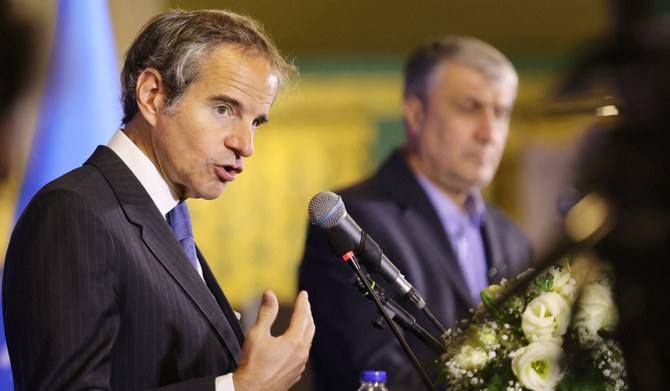
- Grossi said a March 2023 deal with Iran was “still valid” but required more “substance”
ISFAHAN: UN atomic watchdog chief Rafael Grossi, visiting Iran on Tuesday, urged the country to adopt “concrete” measures to bolster cooperation on its nuclear program and address the international community’s concerns.
At a news conference in the city of Isfahan, Grossi said he had proposed in talks with Iranian officials that they “focus on the very concrete, very practical and tangible measures that can be implemented in order to accelerate” cooperation.
The International Atomic Energy Agency director-general held talks with senior Iranian officials including Atomic Energy Organization’s head Mohammad Eslami.
Grossi insisted on the need to “settle differences” on the nuclear issue while the Middle East was going through “difficult times,” particularly with the war between Israel and the Iran-backed Palestinian militant group Hamas in the Gaza Strip.
“Sometimes, political conditions pose obstacles to full-fledged cooperation” between Iran and the international community, he said.
To overcome these obstacles, he said, “we need to come up with concrete steps that are going to be helpful in bringing us closer to these solutions that we all need.”
Grossi said a March 2023 deal with Iran was “still valid” but required more “substance.”
The agreement was reached during Grossi’s last visit to Iran and outlined basic cooperation measures including on safeguards and monitoring. The IAEA chief said, however, that there had been a “slowdown” in the agreement’s implementation including the number of inspections being reduced and the accreditation of a group of IAEA experts being withdrawn by Iran.
Iran suspended its compliance with caps on nuclear activities set by a landmark 2015 deal with major powers a year after the US in 2018 unilaterally withdrew from the agreement and reimposed sweeping sanctions.
“We have this legal right to reduce our commitments when the other parties do not adhere to their obligations,” Eslami said during the joint news conference.
Tensions between Iran and the IAEA have repeatedly flared since the deal fell apart, and EU-mediated efforts have so far failed both to bring Washington back on board and to get Tehran to again comply with the terms of the accord.
The agency has in recent months criticized Iran for a lack of cooperation on issues including the expansion of its nuclear work, the barring of inspectors and deactivating the agency’s monitoring devices at its nuclear facilities.
Why Israel’s military operation in Rafah will lead to ‘inevitable catastrophe’ in Gaza
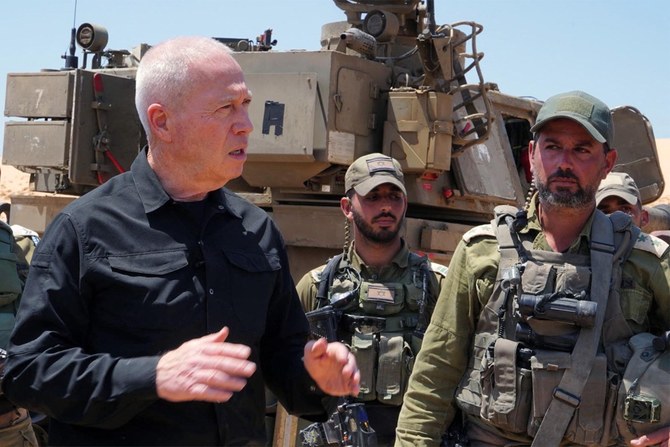
- Israel has seized control of the Rafah border crossing and ordered 100,000 Palestinians to “evacuate immediately”
- Full-scale assault on Rafah would intensify humanitarian emergency throughout Gaza, aid agencies warn
LONDON: Palestinians in Gaza’s southern governorate of Rafah face a desperate situation as the Israeli military proceeds with its long-planned assault on the area, capturing the Gaza side of the border crossing with Egypt and ordering displaced families to move yet again.
The Israeli army announced on Tuesday morning that its 401st Brigade had taken “operational control” of the Rafah border crossing after advancing into the eastern part during the night as part of its mission to dislodge Hamas.
Earlier on Monday, Israel ordered some 100,000 Palestinians in eastern Rafah to “evacuate immediately” to Al-Mawasi, a coastal town near Khan Younis that humanitarian organizations said was “completely uninhabitable.”
Mercy Corps said Palestinians in eastern Rafah were confronted with two impossible choices: Face death under bombardment or attempt a perilous journey to an unlivable area with no access to essential aid.

Bushra Khalidi, advocacy director for Oxfam in the Palestinian territories, says civilians fleeing Rafah have been left with nowhere to go.
She told Arab News that people in Rafah “are worried of even leaving their homes” because they fear they will not find anywhere in the middle area or in Al-Mawasi.
According to the AFP news agency, more than 74 percent of the infrastructure in Gaza has been destroyed since Oct. 7 when Israel launched its bombing campaign in retaliation for the Hamas-led attack on southern Israel.
Al-Mawasi, which Israel had dubbed a “humanitarian zone,” is “already overpopulated and filled with makeshift tents,” said Khalidi. “There is no infrastructure, there (are) no services, and no facilities to host this number of (internally displaced people).”
Moreover, this narrow coastal strip, measuring just 1 km wide and 14 km long, already hosts an estimated 250,000 displaced Gazans, according to the Palestinian Red Crescent.
Ahmed Bayram, media adviser for the Norwegian Refugee Council in the Middle East, stressed that “there is not a corner or a street in Gaza where people can go expecting safety.”
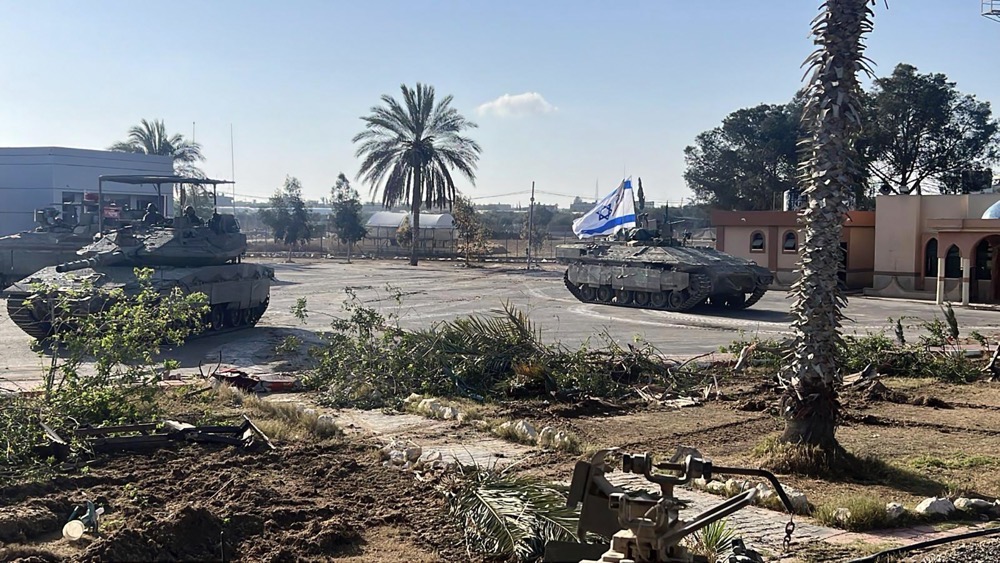
He told Arab News: “Al-Mawasi, which is one of the areas Israel has asked people to go to, is full to the very brim. There is no free spot left in that narrow stretch of land, which is not equipped for such high demand.”
According to Mercy Corps, Al-Mawasi is already a sea of makeshift tents, with little in the way of humanitarian relief, electricity, or water.
It also remains unclear whether Palestinians can flee to neighboring countries through the Rafah crossing now that it is under Israeli control, said Ruth James, Oxfam’s regional humanitarian coordinator for the Middle East and North Africa.
She told Arab News: “Many Palestinians in Gaza currently do not have the recognized right to return to their original homes. Given this context, Egypt, or any other state, should be cautious of inadvertently abetting any potential efforts by Israel, or any other party, to ethnically cleanse the Palestinian population of Gaza.”
Volker Turk, the UN human rights chief, slammed Israel’s evacuation order as “inhumane,” warning that such an action could amount to a war crime, Reuters reported.
Oxfam’s Khalidi also warned that if a Rafah-wide incursion happens, which is the worst-case scenario, it would “entail mass carnage and a complete bloodbath.”
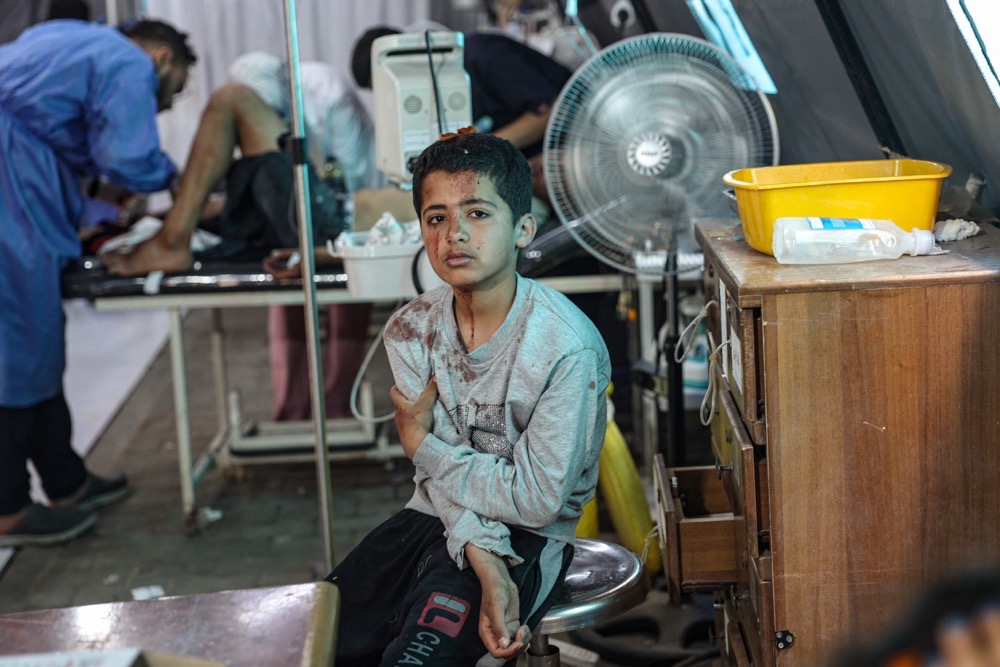
She explained that this is due to “how small” Rafah is and “because of how congested and overpopulated it is.”
Echoing her colleague’s fears, James said: “It’s hard to imagine the scale of need caused by a Rafah invasion. Simply put, this invasion can’t happen. There must be an immediate and permanent ceasefire.”
She added: “The alternative is an avoidable, massive loss of civilian life.”
Despite repeated public objections, even US President Joe Biden’s appeals against the Rafah offensive have gone unheeded.
According to the Associated Press, Biden urgently warned Israeli Prime Minister Benjamin Netanyahu in a phone call on Monday against invading Rafah, stressing it would only lead to more deaths and exacerbate the despair in the embattled enclave.
The Israeli military said its operation in Rafah is designed to eliminate fighters and dismantle infrastructure used by Hamas, according to Reuters.
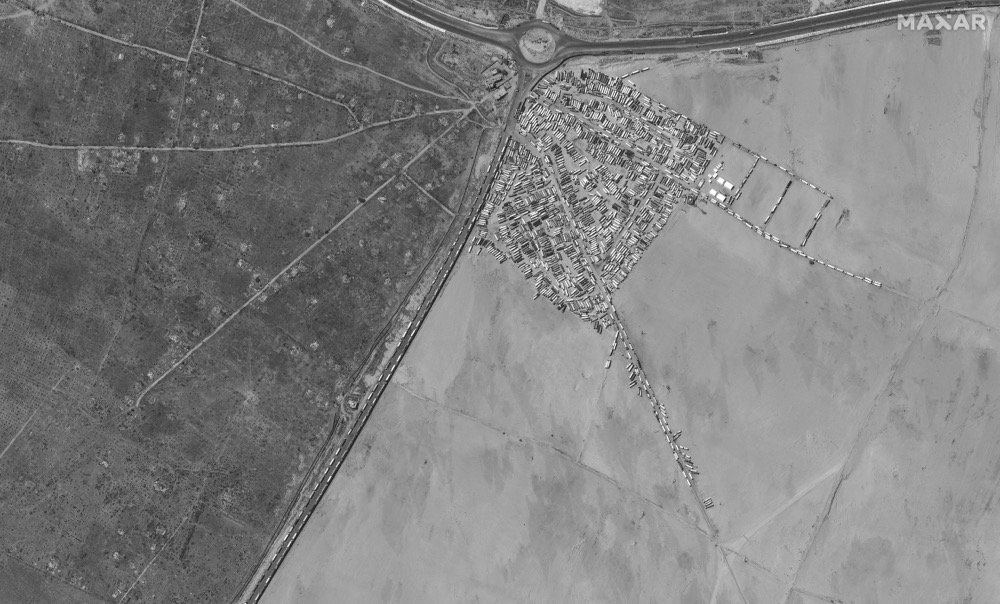
Israel’s overnight strikes across Rafah killed at least 23 people, including five children, according to local health officials.
Prior to that, Israeli warplanes pounded homes in Rafah, killing at least 27 Palestinians, including two babies, according to Gaza’s health authority.
This is despite Hamas accepting the terms of a Qatari-Egyptian ceasefire proposal on Monday.
Humanitarian organizations concur that the impact of Israel’s operation in Rafah will extend beyond the eastern area, affecting more than 1.4 million people who have been sheltering in the southern governorate — and the entirety of Gaza’s remaining population.
“While the initial ‘evacuation orders’ and operations announced in the east of Rafah are directly impacting 100,000 people, over 1.4 million are sheltering in Rafah, half of which are children, and are at direct risk of any escalated military operations across the area,” Salim Oweis, a spokesperson for UNICEF in Gaza, told Arab News.
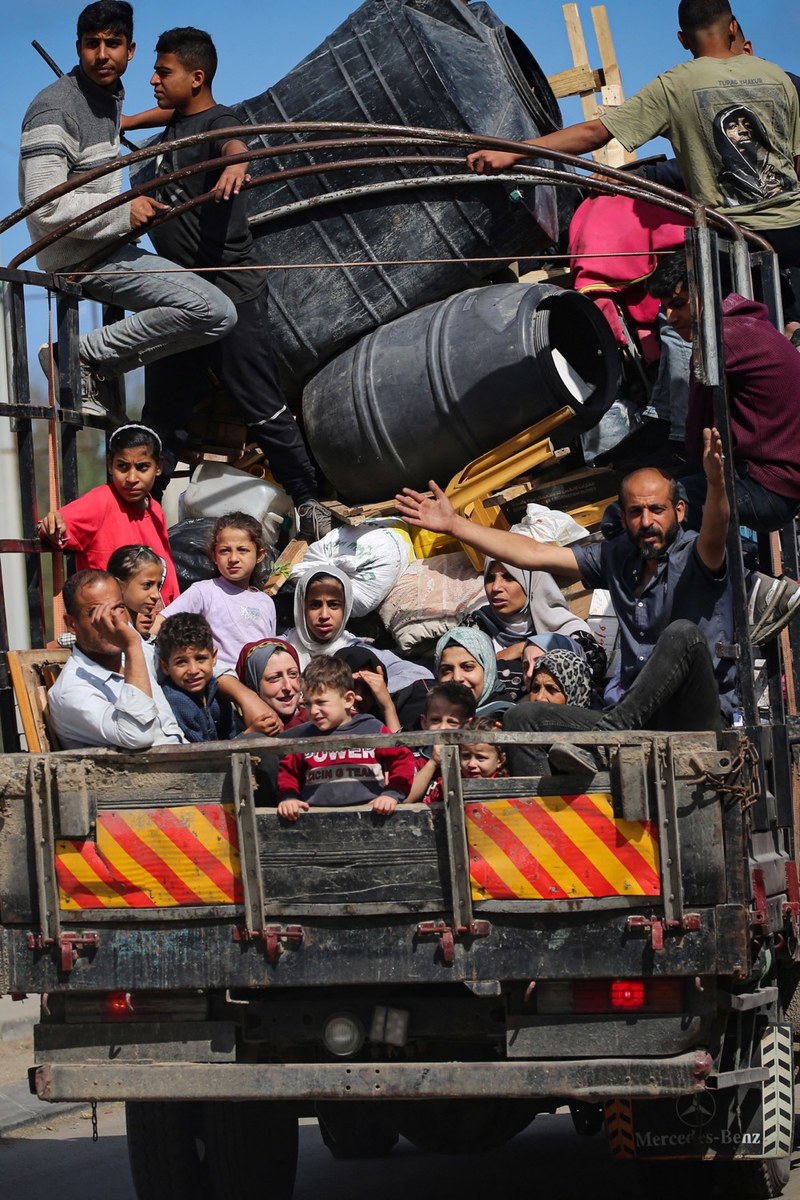
“The extended impact will be far-reaching to include all the 2.2 million residents of Gaza.”
Elaborating, Oweis added: “Rafah is the main hub of all humanitarian response, and any impact on the already struggling aid delivery and humanitarian response will hamper the efforts across Gaza.”
Rafah is the last population center in the Gaza Strip after the seven-month Israeli assault obliterated three-quarters of the besieged enclave, killing at least 34,700 Palestinians according to Gaza’s health ministry, and displacing 90 percent of the population of 2.3 million people.
Israel’s evacuation orders in eastern Rafah, coupled with unceasing airstrikes across Gaza’s south, have instilled panic among the war-weary residents, triggering an exodus of thousands of Palestinians who have nowhere to seek refuge.
Describing the situation across the Gaza Strip as “a state of despair, chaos and confusion” as Israel carries out its assault on Rafah, NRC’s Bayram said that “by issuing its orders, Israel has again pushed over 1 million people into the unknown.”
FASTFACTS
• Israel ordered Palestinians to evacuate to Al-Mawasi — deemed ‘completely uninhabitable.’
• Closing Rafah crossing would cut Gaza’s only viable humanitarian lifeline, warn aid chiefs.
• Fears that Rafah-wide incursion would ‘entail mass carnage and a complete bloodbath.’
He added: “Let’s not forget, while the orders cover an area with 100,000 people east of Rafah, the rest of the population in central and western areas will think they are next to be forcibly transferred, and so they will try to get out while they can.”
Tahani Mustafa, a senior Palestine analyst at the International Crisis Group, foresees a “horrific” humanitarian situation if the Rafah hostilities do not stop.
“All movement of people and goods has been closed off, at a time where famine is already in the north and was very much on the verge in the south,” she told Arab News.
“There’s been no contingency plan in place, and all foreign aid delegations have been evacuated. If this goes ahead as Israel states, it will be a massacre.”
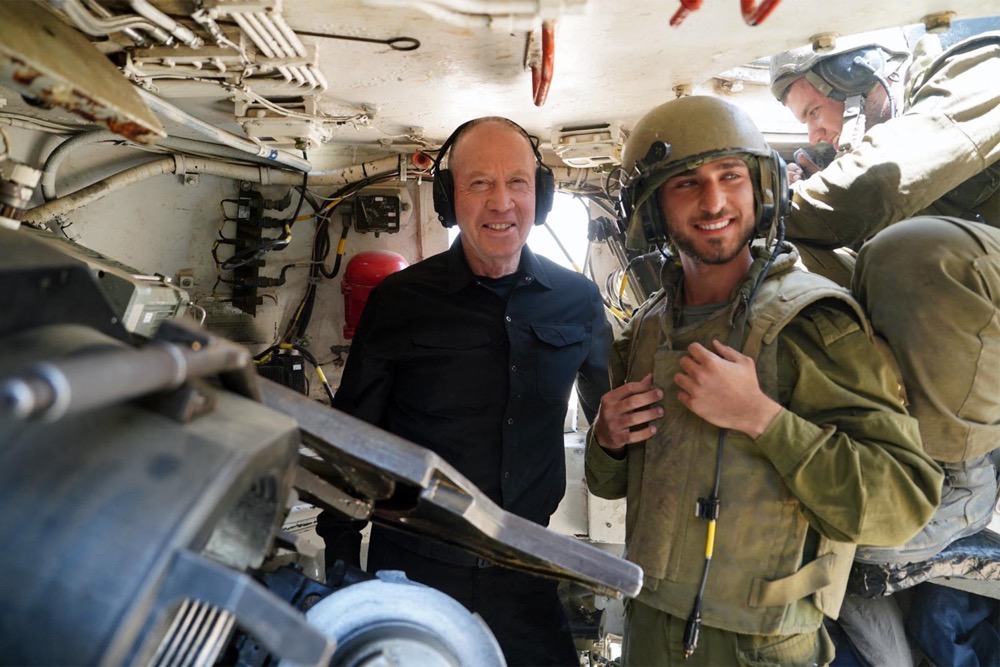
As Israel has blocked aid through the Rafah border crossing, aid groups are concerned about the impact on much-needed humanitarian assistance across the Gaza Strip. This concern is exacerbated by the suspension of aid deliveries to Gaza through the Kerem Shalom crossing following a nearby Hamas rocket attack.
Oxfam’s James cautioned that “even one day of closure (of crossing points) means that additional lives are likely to be lost to hunger and illness.”
She called on Israel to “adhere to its obligations under international humanitarian law to ensure civilian populations are provided with the most essential aid in sufficient quantities.”
Khalidi pointed out that aid organizations “are already facing huge obstructions” in delivering aid across Gaza.
Opinion
This section contains relevant reference points, placed in (Opinion field)
“Often aid is not making it even past Khan Younis,” she said. “And hence the descent to hell, into starvation, that we have seen over the last course of months in the north, but also across the strip.”
Stressing the need to open “all crossings” to meet the immense and deep humanitarian needs in Gaza, Khalidi said: “We’re hearing that maybe other crossings will open, but the problem is that we already had two crossings open, and that was not enough.”

The World Food Programme warned on Saturday that northern Gaza is experiencing a “full-blown famine,” which is “moving its way south.”
Bayram of the NRC also warned that “the entire aid system is at the point of collapse.”
He said: “Closing down the Rafah crossing means cutting off the only viable lifeline currently available for aid workers,” highlighting that the NRC relies on the Rafah crossing to bring in essential aid.
“Fuel is running low already and the existing stocks will not be able to sustain increasing demand,” he added, stressing that “Israel must reverse its plans so we can avoid an inevitable catastrophe.”
UNICEF’s Oweis emphasized that “any interruption to the already limited aid access will have a devastating impact on the humanitarian situation as a whole.”
He added: “With no fuel coming in, all the basic services will be in jeopardy of a total halt, including aid delivery and what’s left of healthcare.
“Not having food entering the strip means that more children will fall into malnutrition and disease, and will be put at heightened risk of death.”

Gaza’s health authority reported on April 25 that since February, at least 28 children, most of them no older than 12 months, had died of malnutrition and dehydration.
Oweis stressed that “the only hope for a way out of a worsening humanitarian catastrophe is simple, and it’s an immediate and long-lasting humanitarian ceasefire.”
He added: “Meanwhile, safe and consistent access for humanitarian organizations and personnel to reach children and their families with lifesaving aid, wherever they are in the Gaza Strip, is crucial.”







